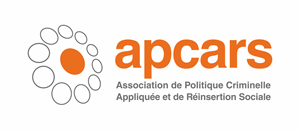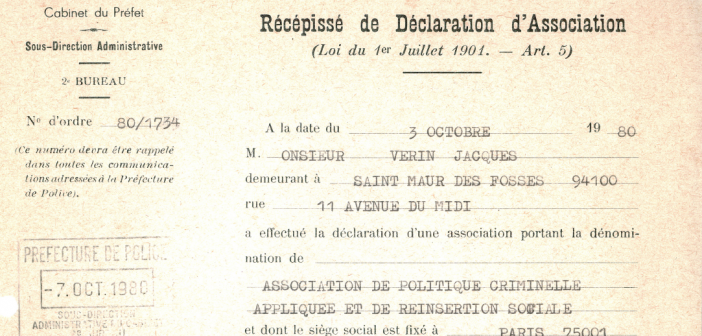In 1976, the Vera Institute of Justice in New York opened a branch in Paris in order to conduct a pilot study at the High Court of Paris in coordination with the Research Center on Criminal Policy.
Its objective was to analyze whether the contribution of verified information regarding the social ties of those indicted for offenses could limit the recourse to provisional detention.
This project, inspired by the new social defense theory, or the humanist movement in criminal policy, considers the criminal act and delinquency to be a social production revealing its multidisciplinary approach.
The study begins in 1977 with both the financial and institutional support of the Ministry of Justice. Initially included in the investigation framework, it was extended to the procedure of flagrante delictos (colloquially defined as ‘caught red handed’) and has now reached the establishment of rapid social investigations (ESR for enquête sociale rapide) prior to the judge’s decision.
On October 3rd 1980 the Association for Applied Criminal Policy and Social Reintegration (APCARS – Association de Politique Criminelle Appliquée et de Réinsertion Sociale) was created. One month later the Parliament adopted an amendment to add the following statement to article 41 of the French Penal Code:
“…The public prosecutor can entrust, to the accredited persons as per the conditions set out in article 81, the task of verifying the material and social situation of persons under investigation…”
The departments conducting the rapid social investigations are opened in 1981 in the High Court of Créteil and in 1984 in the High Court of Bobigny, shortly followed by the personality investigation department in 1987.
In 2002, the association extends its activities to civil justice with the creation of a regional social investigations department for family court judges.
Alongside, and in response to the emerging social precariousness, a walk-in service is opened in 1984 to assist homeless adults in urgent need in hopes of furthering their social (re)integration. In 2006, this service becomes the Housing and Social Reintegration Center (CHRS) specialized in the assistance and integration of persons within the justice system.
APCARS, then commits to pooling together knowledge and practices in order to further its goals by merging with other associations in the social justice sector beginning with the ESTRAN in 2009, the SAJIR in 2010, the VERLAN in 2011 and the SPES Marseille in 2015.
The mergers allowed the association to extend its housing capacity (CHRS), to intervene in the municipal policy sector and to become a major actor in victim support.
AND TODAY
APCARS is a humanitarian association, working with and alongside the justice system, which places the victim, the suspect and the former detainee at the center of its work.
Its professional, participatory and engaged approach is led with the unconditional respect of the person, in their environment, with their own history and future to build.
Our association strives for an enlightened, humane and restorative Justice. APCARS contributes its operational assistance to pursue a penal policy that favors more converted sentences without detention rather than provisional detention.
Contributing to the reintegration of those most destitute in society, facilitating their access to their rights regarding healthcare, employment and housing, committing to those released from prison in helping them regain their autonomy, are all factors to maintain social peace and prevent recidivism.
Our association integrates its action with reference to texts by the Council of Europe, whose mission is to promote democracy, protect human rights and the rule of law in Europe.
APCARS is one of the rare associations in France able to offer the justice system an integrated, judicial and social approach, an operational platform prior to and post penal judgment, dedicated to the perpetrators as well as the victims. Its long history and experience grant it a special legitimacy and recognition. Its capacity to adapt and innovate renders it a proactive source of proposals.
Today, APCARS is an association that defines itself as:
– An essential auxiliary to an efficient and humane Justice
– An operational partner of penal policy
– An active actor in victim support
– A socially engaged actor in reintegration and recidivism prevention
– An independent and innovative expert on questions of Justice


